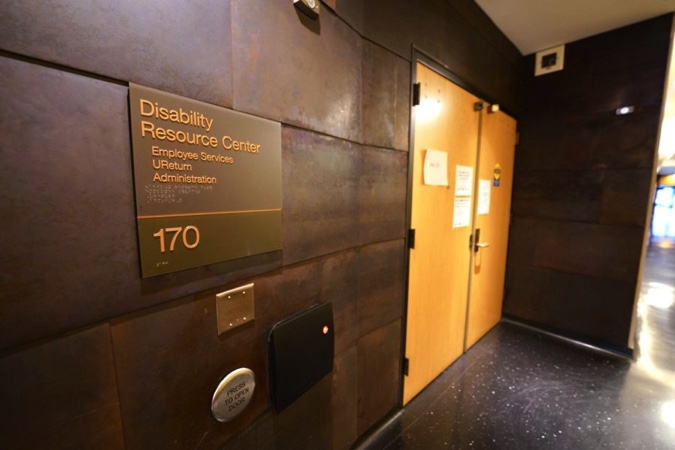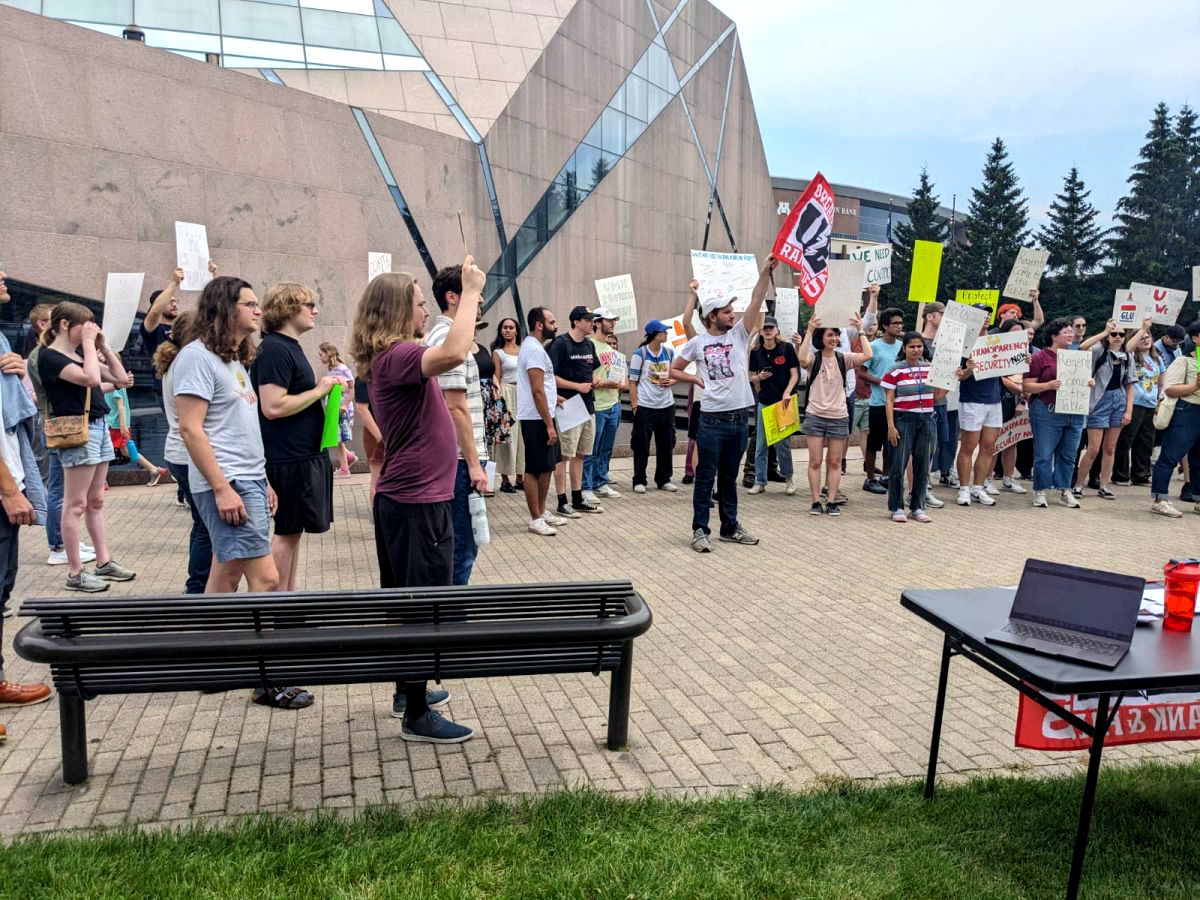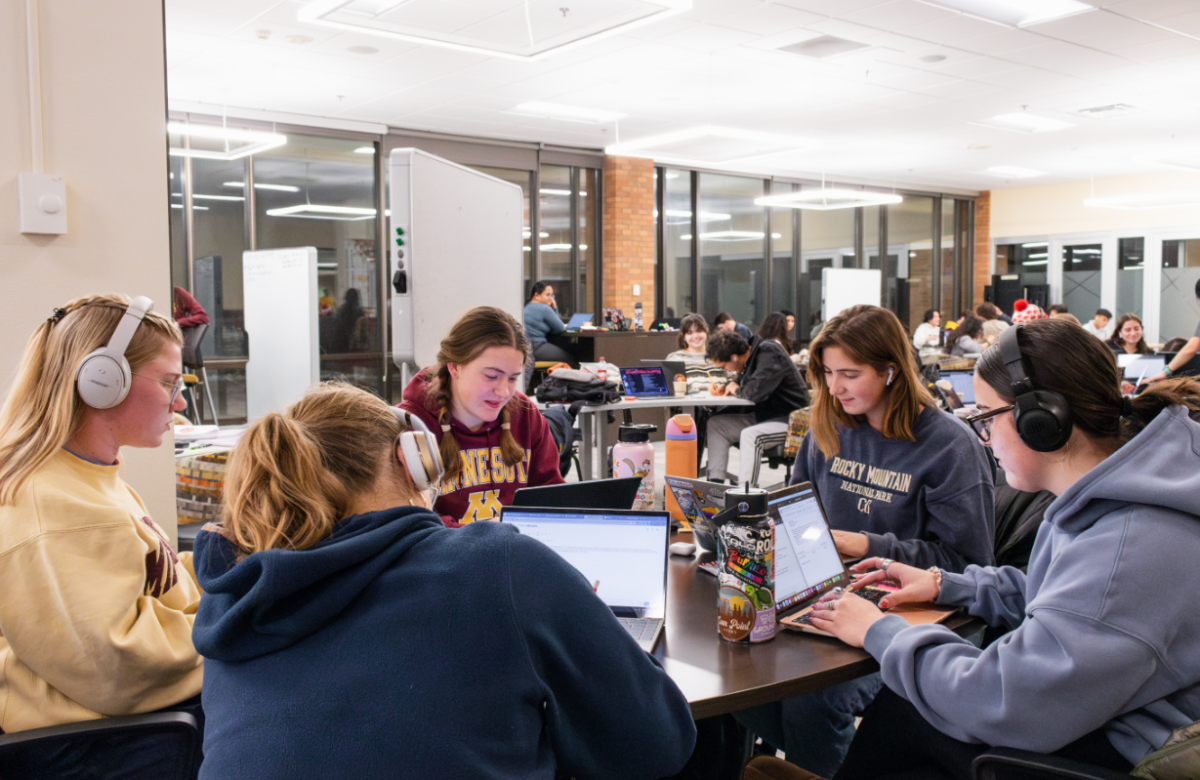The University of Minnesota is exploring a process change to have the Disability Resource Center (DRC) communicate accommodations to faculty on behalf of students.
Current DRC process requires students to communicate their accommodations to their professors, often exposing the uneven power dynamic between the two sides, where students often can feel intimidated by their professor. The process change aims to ensure students with disabilities can get their necessary accommodations, according to the DRC.
Enjie Hall, the DRC director and the University’s Americans with Disabilities Act coordinator who joined the University last year, said she took on this project following feedback from both students and faculty who felt the current system was ineffective.
“This general concern about the power dynamic is something that has been articulated that I have heard,” Hall said. “On the faculty side, effectively managing the accommodations.”
Hall added she imagines a system of self-advocacy balanced with institutional responsibility where students decide how they want to utilize their accommodations and when to share them, while the DRC acts as the primary communicative liaison with faculty.
Zak Farah, Diversity and Inclusion Committee director for the University’s Undergraduate Student Government, said the new process would be beneficial as it allows the DRC to act more in its capacity as a bridge between students and faculty.
“Symbolically, it would be a massive step forward in terms of the academic success of students and faculty interaction,” Farah said.
Hall said the uneven power dynamic between professors and their students can often create an uncomfortable or intimidating environment for students advocating for their accommodations.
“That’s what we’re taking a hard look at,” Hall said. “What is that institutional responsibility? Who should be responsible for accessibility? Where do we also amplify the voices of our students?”
Isabel Laderman, a third-year education student at the University, said she has worked continuously with the DRC to get accommodations for Ehlers-Danlos Syndrome, a connective tissue disorder, since her freshman year.
Due to the chronic pain caused by her Ehlers-Danlos, Laderman said it can be difficult for her to complete everyday tasks, like taking exams or walking to class at the same rate as her peers, which her accommodations aim to support.
Although Laderman said she feels more comfortable communicating her accommodations to her professors now, she remembers it being an intimidating conversation when she first came to the University.
“When you have to email your professor you’re then forced to disclose your disability and it can be very intimidating,” Laderman said. “Especially if you have experiences of ableism.”
In high school, Laderman said she had negative experiences with teachers who she felt were dismissive of her disability and often reluctant to accommodate it. When she came to the University, Laderman worried she would combat similar reluctance.
Laderman added she has been lucky because most of her professors have respected her accommodations, but she knows other students who have faced arguments with their professors over accommodations, sometimes needing to involve their access consultant to advocate for them.
In situations like these, Laderman said a new system in which the DRC communicates accommodations to faculty would give credibility to student disability accommodations, taking considerable pressure off of students, particularly those like her who had negative experiences previously.
“You may just have a really terrible background experience with accommodations,” Laderman said. “You’re already transitioning to this entirely new school and a lot of times location just adds that extra pressure.”
Hall said there is a possibility for a future online portal allowing faculty to see their students’ accommodations in an organized digital format.
“Professors have lots of students in their class, and when they’re trying to figure out and organize 30 students and their individual accommodations that can be a chunk,” Hall said.
Other campuses in the University’s system have already implemented this change, according to Hall. Technological barriers involving the DRC’s case management system have kept the Twin Cities campus from making the switch, though she commits to implementing new measures as soon as possible.
“There is nothing more important than us being able to serve the community that we are here to serve,” Hall said.
Clarification: The previous version of this article missed the word policy. The DRC is looking into a process change.
















MP
Nov 14, 2023 at 7:38 am
What a good suggestion, Lee Penn, thank you. I’m also an instructor and I would like all students to know most of us are highly invested in our students’ safety, comfort and success. We want and need to know about how to best accommodate you. When students with accommodations share their needs with instructors, all students benefit. In an ideal world, we would not need accommodation letters; we’d figure out ways for everyone to feel less stress and enjoy equal access around deadlines, assessments and attendance. We’re not there yet, though, and it’s not fair for some students to have to disclose personal information. This comment also serves as a way to express my gratitude to the DRC for all they do and have done for our students. Thank you, DRC!
Lee Penn
Nov 13, 2023 at 5:06 pm
As in instructor, I would love to see an online portal that would allow me to see students’ accommodations in one place. It’d be especially good if students simply could click yes or no for each course. Then, I’d see the names for students who consented to inclusion in the portal. If the list of names changes (a student clicks yes later in the semester) or if the nature of the accommodations changes, then the instructor could simply receive a notification that their accommodations portal has been updated. For each student, the DRC access assistant could be identified, with contact information, in the event that there are questions.
THIS WOULD BE AMAZING!!!! It would help instructors ensure that they haven’t missed someone when exam time comes up etc…. AND it students would still have control over when they wish to share information about barriers they face due to disability(ies). I think a portal like this could substantively lower the barrier for accessing and providing accommodations.
Barry Peterson
Nov 9, 2023 at 3:59 am
[Note: This edition of my reply to the article is a fully edited copy. Please do not prnit the first copy. Print this one. Thank you]
This was a great article. I’m glad the University of Minnesota is finally taking disabled students seriously.
When I was at UMN in the 1980s and 1990s, I experienced ablism from one of my business adjunct professors at Carlson School of Management. I didn’t think to contact my cousin who was closely involved with Curtis Carlson, the billionaire whose name is associated with the school.
I had anxiety disorder, which still affects me to some degree. It is a fear of failure and a fear or discomfort with some people. During the three days preceding the final exam, which was valued at 60% of the grade, I stayed awake 24 hours each day trying to study, as I feared multiple choice exams.
I wrote fifteen papers for the guy, who was an attorney. Fourteen of the papers received an A. One of them received a B. I received an A in classroom involvement. I failed the exam and received a D for the course grade. I enjoyed everything about the class except for the final exam; and except for the arrogant and rancid personality of the adjunct professor. He flatly ignored my request for a retake of the exam or a comparable exam due to the anxiety and insomnia I experienced that week.
When I lived in the dormitory (Centennial Hall), I had both horrendous difficulty with what are now called Community Assistants, but which were then called Resident Assistants.
The depression was more intense than it is now because when it first struck me when I was 25-years old, we didn’t have the greatest medication. Moreover, the naive public, which included students, staff and professors, got their ideas about “mental illnesses” from poorly educated news journalists who report with, ”and this murderer has a history of mental illness,” and from movies like Silence of the Lambs and Psycho, and One Flew Over the Cuckoo’s Nest, which depicted folks with mental health conditions as stalkers, harassers and killers.
First, the National Alliance on Mental Illness (NAMI) reports that only five percent of violent crimes are committed by people with any one or more of the over six-hundred (600+) sub-variants of mental illnesses (“Mental illness” is not a diagnosis) which can vary from being very slight impairments in comfort, such as nail-biting syndrome, or caffeine addiction, to more serious forms of mental illnesses such as “schizoid-type personality disorder with violent tendencies” which a young man in the 1980s had who tried to assassinate U.S. President Ronald Reagan, and whose bullet hit a friend of a friend of mine, Oval Office Press Secretary James Brady.
This formerly young man’s neuro-chemicals were not in alignment with healthy reality, and he thought that by shooting a U.S. president, he would garner the positive attention of a then prominent Hollywood actress, Jodie Foster.
Forty years later, he has found the right medication and therapist and is out of the hospital prison, but cases like his are very rare among the population-at-large. Yet, Hollywood and incompetent and thrill-seeking journalists do the nation and other readers a huge dis-service by saying that a killer suspect had a history of mental illness, when, in fact,95% of violent crimes are committed by people without a mental illness, as NAMI indicated. This skews the perception among the naive public regarding the relative safeness of people with mental illnesses of all kinds.
My experience in the dormitories, at the Mayo Building as a sr. office assistant at Quality Assurance, and elsewhere on campus during both the daylight and night-time hours, were fraught with two years of assaults, harassment, stalking and minor annoyances. I also received a death threat on my answering machine. Mostly from the assailant Hai N.
The events came to me via the family relationship of someone who I thought was a friend, a medical student named Son N. He told his brother about my situation. For three years, from late spring 1987 to summer of 1989, I received unconscionable abuse from his brother and his brother’s friend.
Captain Francis Gernhandt and a female officer (LT Metcalf), both told me that because I was “Mentally Ill” that I brought on my own problems. Gernhandt, in my opinion was a freak of nature when it came to mental illnesses, and very ignorant. LT Metcalf told me in a telephone call to stop calling UMPD. The University of Minnesota has never settled with me in or out of court, and because I had two “mental illnesses” as the community bought into this nonsensical label and were ableists in the worst way, I couldn’t get an attorney, though my dad was a former Associate U.S. Attorney, a former Associate Minnesota Attorney General and President of the Anoka County Bar Association. Even HE had hang-ups about his son and didn’t understand that my heightened angst was a result of people not coming to my aide and who vilified me for a problem which included minor energy fluctuations and fear of people (i.e., Bipolar Depression and Anxiety).
I’ll tell you, when I went into hypomanic episodes, I became very creative and got A’s on very interesting courses. But when this harassment and the assaults began to happen, my grades went down to C’s, D’s and an F. Years later, I learned how to take multiple choice exams, an in the insurance courses which I took, I received final chapter grades from 86% to 100% correct. I passed the state licensing exams (two of them) on the first try within 30% of the time allotted for the exams. I was also not being bothered by anyone. When I studied in Norway, Denmark and Costa Rica, my grades hit similar heights of excellence.
Hence, I credit my poor grades to the low-life students who harassed me and who refused to comply with a Hennepin County District Judge’s order (who graduated from Harvard College and Hamline Law School, and who had Bipolar mania –excessively high energy at times), and the redneck UMPD officers (who I hope have gone away), Vice President of Student Affairs, Dr. Marvalene Hughes, and the gossips on the Housing Service payroll, with ableism and contempt for a student whose aim was to become an attorney, businessman, diplomat, and philanthropist. I worked with my neighbor, University of Minnesota Law School alumni and U.S. Vice President and Ambassador to Japan, Walter Mondale, and was treated better, and enjoyed telephone calls with him in recent years before his passing.
My dad was also connected with the family of U.S. Vice President Hubert H. Humphrey, and worked closely and in friendship either Skip Humphrey III at the Office if the Minnesota Attorney General.
I feel like I’ve had 43 years of betrayal from my parents, my high school and college administrators and professors who knew what was going on. My grades suffered. My self-esteem suffered. I didn’t go to law and public affairs graduate programs because I felt so beaten down. For years, I had suicidal thoughts when memories of the past triggered my senses. This went on for forty-seven years, though in recent months, I haven’t experienced them and feel that I have made a breakthrough. I sigh when I realize that when I meet friendly people, that I believe they may have a hostile and overly judgmental attitude about me, though one of my language students from Shenzhen, China, an electrical and computer engineer, came out and told me that he has always thought of me as a kindly gentleman and great instructor.
I will say that despite all of this, I received letters from the offices of the individuals of the Israeli Prime Minister Ariel Sharon (on executive stationary from his executive assistant, Berit) and from Nobel Peace Prize Laureate Desmond Tutu, commenting on my kindness, my altruistic friendship, and my loving sentiments for the peoples of Israel and Palestine; and who my classmates an I met in Norway in December 1984 at our school and at a community center for stories, singing, and other celebratory experiences.
The notion of Minnesota Nice is a farce. It is more like Minnesota Shallowness. I hope, however, that the Disability Resource Center will have an effective and long-term POSITIVE effect of students, faculty, staff and administrators.
At age 61, I am just now beginning my economic life. I’m tired of working with brash, violent and angry people who do not respect others and whose sense of musical talent involves listening to groups such as Guns and Roses, and their song. “I used to love her, but I had to kill her.” I want peace and friendship in my life.
By the way, the statement in the article which said, “There is nothing more important than us being able to serve the community that we are here to serve,” Hall said, should have been, “There is nothing more important than us being able to serve the community that we are paid to serve.” Persons employed in any occupation should consider themselves as servants to the public (public servants) for best results, or they should leave for an occupation with a better fit.
It should also be noted that UMPD, Housing Services, the Vice President of Student Affairs, and the Office of the President, as well as the General Counsel, MUST be sensitive to the 20%+ of Americans who experience one of more mental illnesses, and if they are not, they should garner no loyalty from Human Resources of their supervisors — and they should have their jobs immediately terminated — whether they are an executive or a janitorial worker.
Moreover, the Mayo Clinic wrote in an article a few years ago that 30%+ of college students experience both depression and anxiety. Let’s start being automatically humane to persons with disabilities, whether or not they have a mental health condition.
Thanks for reading,
Barry N. Peterson
Minneapolis, MN USA
University of Minnesota College of Liberal Arts
Class of 1996
Former Student Senator of College of Continuing Education and Extension (now College of Continuing and Professional Education)
November 9, 2023
03:55 Hours